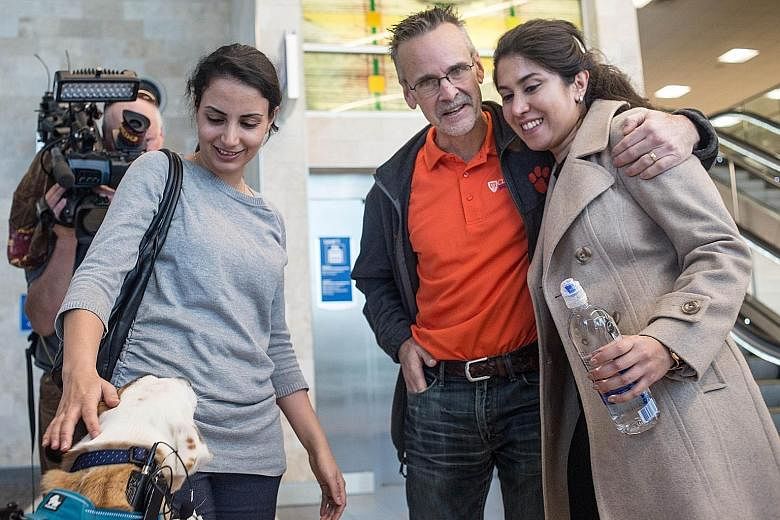NEW YORK • Seventeen elite universities in the US, including Harvard, Yale and Stanford, have joined forces to fight President Donald Trump's ban on travel to the US by refugees and citizens of seven Muslim-majority countries.
The schools said in court papers that the ban threatens their ability to recruit students, faculty and scholars from abroad and to "meet their goals of educating tomorrow's leaders from around the world".
They added: "These international students, faculty and scholars make significant contributions to their fields of study and to campus life."
The schools filed papers on Monday in a Brooklyn federal court seeking a judge's permission to join a lawsuit fighting the ban.
The American Civil Liberties Union and immigrant rights groups' lawsuit has already led to a national order barring the government from relying on the ban to deport those who arrived on US soil.
Other schools joining the request are Brown, Carnegie Mellon, University of Chicago, Columbia, Cornell, Dartmouth, Duke, Emory, Johns Hopkins, Massachusetts Institute of Technology, Northwestern, University of Pennsylvania, Princeton and Vanderbilt.
-
42,000
Number of academics from around the world who have called for a boycott of conferences in the US, including 62 Nobel laureates and 813 members of the National Academies of Sciences, Engineering and Arts .
The travel ban barred Syrian refugees indefinitely, and blocked for 120 days all others fleeing their homelands claiming persecution or fear of violence. No citizens of Syria, Iran, Iraq, Yemen, Somalia, Libya or Sudan initially could enter the US for 90 days. The government amended the directive to allow those citizens to enter if they held a US permanent resident permit.
In a separate lawsuit pending in Seattle, a federal court has blocked the government from enforcing key parts of the ban, which critics claim illegally singles out Muslims.
The schools said it is their mission to attract the world's best scholars, faculty and students as they strive to foster a rich educational environment and draw from all over the world.
During the 2015 to 2016 academic year, more than one million international students studied at US universities, according to the schools. Yale, for example, has over 4,000 international students and scholars, or about 11 per cent of its undergraduates and 20 per cent of its total student population, the school said.
The ban has negatively affected students, scholars and faculty, stranding some abroad while preventing others from travelling to their homelands for field research, academic meetings and personal obligations, according to the schools.
Many are studying in the US under special academic visas, and had already been subjected to extensive vetting to enter the country and been deemed not to pose a threat, the schools added.
The US State Department also "provisionally revoked" the visas of most scholars from the seven affected countries, without any evidence to support the administration's actions, according to the schools.
And the potential for harm continues, the schools said. Over 42,000 academics from around the world have called for a boycott of conferences in the US, including 62 Nobel laureates and 813 members of the National Academies of Sciences, Engineering and Arts.
Meanwhile, companies that sustain the US$324 billion ($460 billion) US biotech industry are increasingly alarmed as Mr Trump considers following his controversial travel ban with restrictions on skilled foreign immigrants.
To crank out discoveries, US biotech firms such as Amgen and Gilead Sciences, as well as overseas companies with operations in the US, rely on the world's best scientists and lower-level researchers with scarce expertise. A crackdown on visas for these workers could set back research, including the treatment of cancer, executives said.
BLOOMBERG
SEE OPINION

